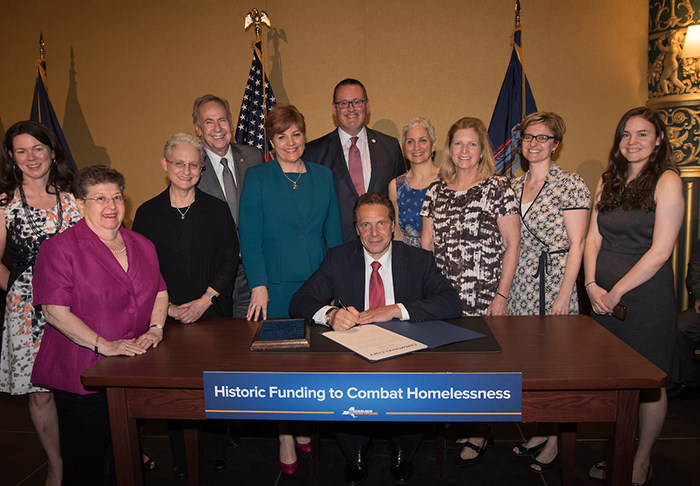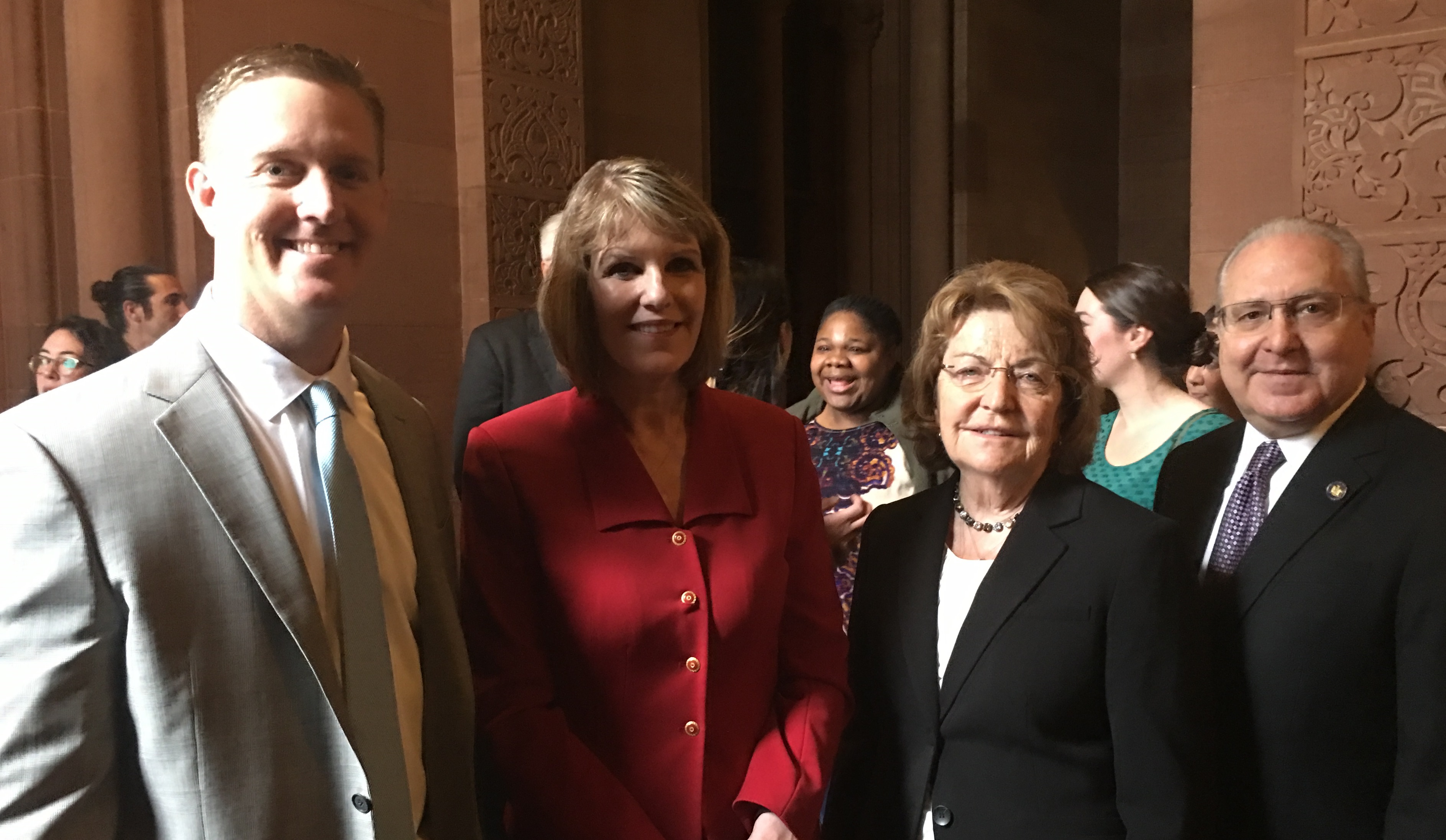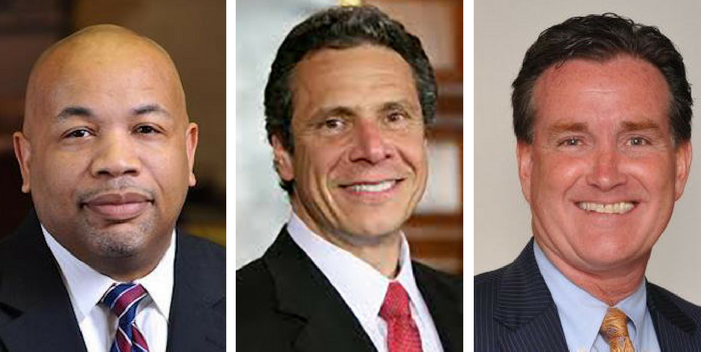House’s Tax Reform Will Decimate Affordable/Supportive Housing Development
Nov.27.2017
(1).jpg)
Renaissance Village, affordable/supportive housing for homeless veterans on Long Island was developed with Private Activity Bonds that have been eliminated in House’s version of tax reform.
While both the Senate and House versions of tax reform would result in huge deficits that will impact all non-defense spending including homeless housing programs, the House bill (HR 1) that passed on November 16, would have a devastating impact on affordable and supportive housing by eliminating tax exempt private activity bonds (PAB). These bonds provide capital funding in conjunction with the 4% LIHTC. These credits are available as-of-right, and automatically qualify for PABs. They are responsible for about half of the affordable housing development across New York State.
While HR 1 preserves the 9% Low Income Housing Tax Credit (LIHTC), drastic proposed cuts to the corporate tax rate will erode the LIHTC’s value by an estimated 25%.
It is estimated that the state will lose $4.5 billion dollars and 17,000 units of affordable housing annually with these changes. Also eliminated are Historic Tax Credits and New Market Tax Credits, two valuable tools used to spur housing and community development.
The Network, along with a broad swath of affordable housing groups and housing agencies, immediately began advocating against HR1: We alerted our membership to share their opinions about the bill with their representatives; we put out a joint press release; and we published editorials defending the restoration of private activity bonds to the bill. We also led a series of key meetings in Washington, D.C. with several of the Republican representatives whose votes were in play.
In the end, all amendments to the bill were defeated along straight party lines. HR1 passed with 227 votes for, and 205 votes against, with only 13 Republicans voting against it. This group of Republican dissenters includes five New York State representatives: Donovan, Faso, King, Stefanik, and Zeldin, whose opposition was based primarily on the elimination of deductibility for state and local taxes. The PAB cuts are a concern that several of these representatives raised during a press conference explaining their votes. All Democrats voted against the bill.
The Senate Finance Committee introduced its own tax reform bill, after rejecting the House bill unanimously. This bill preserves the PAB, and the 9% LIHTC although, again, the drastic cut to corporate tax rates will lead to the same 25% devaluation of tax credits. It will only require a majority to pass in the Senate, which is closely divided. Both New York Senators are opposed, as are the rest of the Democrats. This bill passed out of the Finance Committee and will face fierce debate on the senate floor. A vote is expected after Thanksgiving recess. If this competing bill passes, the House and Senate will form a reconciliation committee to produce a final version of the bill.
Attempts are also being made to improve both versions of the bill, by addressing the loss of value to the 9% LIHTC, and by adding provisions of the Cantwell-Hatch bill that would improve the efficiency of the program. Some of these provisions may make it into the final Senate bill. Unless the Senate bill fixes the loss in valuation of the credit, there will be a significant loss of capacity to develop affordable and supportive housing.
In other news, The FY 2018 budget has yet to be resolved. At the beginning of the tax reform process the House agreed to the Senate’s higher overall budget numbers, to allow for the Senate to vote on tax reform under reconciliation, which requires a simple majority. In general, the last Senate HUD budget proposal, was the most favorable to supportive housing with modest increases to McKinney and Section 8, and flat funding in other key programs. The final budget details have not been formalized and another short term continuing resolution is expected, as the current CR expires December 8.
The Network will continue to work with our local affordable housing partners and our national partners, including the ACTION Coalition, National Alliance to End Homelessness and the National Low Income Housing Coalition to fight for increased resources for affordable and supportive housing.
RFPs Released in June
Jun.27.2017

June has been a busy month for the release of Requests for Proposals (RFPs) in the New York supportive housing community. From services and operating, to capital, to congregate, to scattered site, our government agencies have all the bases covered. These RFPs are part of the initial push to meet the ambitious targets set by Mayor de Blasio (15,000 supportive housing units over 15 years) and Governor Cuomo (20,000 units over 15 years).
Continue Reading …Executive Budget Proposes Devastating 15% Cuts to HUD
May.24.2017
 On May 23rd, President Trump released his first budget proposal for FY 2018, which begins October 1, 2017. While it provides more detail than the “skinny budget” short-form budget released in March, it slashes domestic spending dramatically and HUD programs are specifically under attack. Whole block grant programs (which are critical to the production of supportive housing), including Community Development Block Grant and HOME Investment Partnerships are eliminated, along with the Interagency Council on Homelessness. It also strips funding from the National Housing Trust Fund, funding specifically targeted to building affordable housing to the nation’s poorest households. The Veterans Affairs Supportive Housing (VASH) receives no new vouchers in the president’s budget proposal.
On May 23rd, President Trump released his first budget proposal for FY 2018, which begins October 1, 2017. While it provides more detail than the “skinny budget” short-form budget released in March, it slashes domestic spending dramatically and HUD programs are specifically under attack. Whole block grant programs (which are critical to the production of supportive housing), including Community Development Block Grant and HOME Investment Partnerships are eliminated, along with the Interagency Council on Homelessness. It also strips funding from the National Housing Trust Fund, funding specifically targeted to building affordable housing to the nation’s poorest households. The Veterans Affairs Supportive Housing (VASH) receives no new vouchers in the president’s budget proposal.
Governor Signs Legislation for $1 Billion to Build 6,000 Units of Supportive Housing
May.19.2017

Governor Andrew Cuomo with advocates at the bill signing.
Yesterday Governor Andrew Cuomo, accompanied by Speaker of the New York State Assembly Carl Heastie, Building and Construction Trades Council of Greater New York President Gary LaBarbera, and Breaking Ground's President and CEO Brenda Rosen, signed a historic bill announcing $2.5 billion for the creation and preservation of 6,000 new units of supportive housing and over 110,000 units of affordable housing over the next five years, in the ballroom of Breaking Ground's The Prince George. This capital funding is the first installment in the Governor's unprecedented commitment to build 20,000 new units of supportive housing over the next fifteen years.
Continue Reading …Federal Budget Update
May.15.2017
 President Trump signed the final FY 2017 budget May 5th, in the form of a bi-partisan supported omnibus spending package. HUD programs are funded from October 1, 2016 through September 30, 2017 at levels that will ensure that most key supportive housing programs will be sustained.
President Trump signed the final FY 2017 budget May 5th, in the form of a bi-partisan supported omnibus spending package. HUD programs are funded from October 1, 2016 through September 30, 2017 at levels that will ensure that most key supportive housing programs will be sustained.
Thanks to Our Government Partners for $1 Billion in Supportive Housing Capital!
Apr.28.2017

Assembly Member Andrew Hevesi, Senator Cathy Young, Senator Betty Little, and Assembly Member Steve Cymbrowitz being recognized for their critical support.
A press conference was held April 26th at the Capitol in Albany to thank our government partners and celebrate the successful culmination of the Campaign 4 NY Housing. We now have an unprecedented capital commitment for 6,000 new supportive housing units over five years from New York State.
Continue Reading …NYS Budget Provides Funding for Five Years of Supportive & Affordable Housing
Apr.07.2017

Speaker Heastie, Governor Cuomo, and Majority Leader Flanagan
The Network would like to thank Governor Cuomo, Speaker Heastie, and Majority Leader Flanagan for funding five years of supportive and affordable housing to address New York’s homeless and affordable housing crisis. On behalf of our community, our more than 200 supportive housing providers and the thousands more vulnerable homeless people they will now be able to serve, thank you. This is a great day for New York.
Continue Reading …Federal Budget Update
Mar.20.2017
![]() On March 16th, President Trump released a budget blueprint that proposes $6.2 billion in cuts to HUD funding. Overall, these cuts represent a 13.2% decrease in funding compared to FY16 levels: the largest cuts in housing assistance since the Reagan administration, which ushered widespread homelessness. These cuts are unacceptable and we are committed to fighting them.
On March 16th, President Trump released a budget blueprint that proposes $6.2 billion in cuts to HUD funding. Overall, these cuts represent a 13.2% decrease in funding compared to FY16 levels: the largest cuts in housing assistance since the Reagan administration, which ushered widespread homelessness. These cuts are unacceptable and we are committed to fighting them.
The Trump budget eliminates the following programs:
 The HOME program is a critical resource for supportive housing in New York, serving as a capital subsidy for congregate developments, as well as providing rental assistance to the homeless. Nationwide, every $1 of HOME capital funding leverages $4.20 of additional local public and private funding. Community Development Block Grants (CDBG) fund cities and towns across the state for capital projects and programs benefiting low- and moderate-income New Yorkers.
The HOME program is a critical resource for supportive housing in New York, serving as a capital subsidy for congregate developments, as well as providing rental assistance to the homeless. Nationwide, every $1 of HOME capital funding leverages $4.20 of additional local public and private funding. Community Development Block Grants (CDBG) fund cities and towns across the state for capital projects and programs benefiting low- and moderate-income New Yorkers.
New York State Budget Update
Mar.17.2017
![]() This week, the Assembly and Senate approved their one-house budgets, which serve as their spending proposals in response to the Executive budget released in January. There are no major changes to the programs important to supportive housing from the Executive proposal.
This week, the Assembly and Senate approved their one-house budgets, which serve as their spending proposals in response to the Executive budget released in January. There are no major changes to the programs important to supportive housing from the Executive proposal.
HHAP Awards Go to Three Network Members
Feb.24.2017
![]() On February 1, 2017, the Homeless Housing Assistance Corporation awarded funding from the State’s Office of Temporary and Disability Assistance (OTDA) Homeless Housing Assistance Program for three supportive housing projects being developed by Network members. Together these projects will provide 142 new units of supportive housing.
On February 1, 2017, the Homeless Housing Assistance Corporation awarded funding from the State’s Office of Temporary and Disability Assistance (OTDA) Homeless Housing Assistance Program for three supportive housing projects being developed by Network members. Together these projects will provide 142 new units of supportive housing.
